Quantum Bundle
How is Quantum Company Redefining Data Storage Sales?
Quantum Corporation, a stalwart in data storage, is making waves with its evolving sales and marketing strategy. From its roots in traditional storage to its current focus on cloud-based solutions and AI-driven data management, Quantum's transformation is a compelling case study in adapting to the ever-changing technology landscape. This strategic pivot is critical, especially as the global data storage market booms.
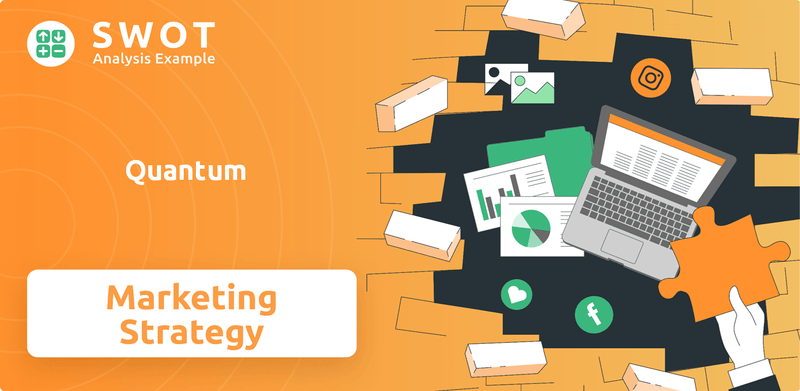
This deep dive into Quantum SWOT Analysis explores the company's shift in focus, from its go-to-market strategy to its efforts in the Quantum technology market. We'll examine how Quantum company sales and marketing teams are navigating the competitive landscape, leveraging digital marketing for quantum companies, and building a robust sales and marketing strategy. Understanding Quantum's approach offers valuable insights for anyone interested in Quantum business strategy and the future of data management.
How Does Quantum Reach Its Customers?
The sales and marketing strategy of the Quantum company centers on a multi-channel approach, blending direct sales efforts with strategic partnerships to effectively reach its target customer base. This strategy is crucial for navigating the complex data-intensive industries Quantum serves. The company's evolution highlights a significant push toward cloud and software solutions, positioning it to capitalize on the growing demand for scalable and secure data management.
A key element of Quantum's sales strategy involves dedicated direct sales teams that engage with leading organizations across various sectors, including life sciences, government, media and entertainment, research, and industrial technology. This direct engagement is complemented by the Quantum Alliance Partner Program, which was enhanced in April 2025, providing partners with new tools, training, and incentives.
The company's strategic alliances, such as the collaboration with Microsoft to integrate its cloud storage solutions with Azure, are vital for expanding its reach in multi-cloud environments. While specific details on the performance of online versus offline channels are not publicly detailed, the focus on cloud-based solutions and digital transformation indicates a strong strategic shift towards digital adoption and omnichannel integration. The introduction of a subscription-based model for offerings like the DXi T-Series, launched in March 2025, also reflects an evolving sales model that emphasizes recurring revenue streams and simplifies customer engagement. This approach is crucial for sustaining growth in the competitive Quantum technology market.
Quantum employs direct sales teams that focus on engaging with key organizations. These teams target sectors such as life sciences, government, and media. This direct approach allows for tailored solutions and relationship building.
The Quantum Alliance Partner Program is a key component of the sales strategy. Enhanced in April 2025, it provides partners with tools, training, and incentives. This program aims to empower channel partners to lead conversations around AI, analytics, and data strategies.
Quantum forms strategic partnerships to extend its market reach. A notable example is the collaboration with Microsoft for cloud storage integration. These partnerships are crucial for expanding into multi-cloud environments.
The company is adopting a subscription-based model for certain offerings. The DXi T-Series, launched in March 2025, exemplifies this shift. This model supports recurring revenue and simplifies customer engagement.
Quantum's sales strategy leverages both direct sales and channel partnerships to maximize market penetration. The company focuses on cloud solutions and digital transformation to meet evolving customer needs. The emphasis on a subscription model is part of a broader effort to streamline customer interactions and ensure sustainable revenue streams.
- Direct Sales: Dedicated teams targeting key accounts in data-intensive industries.
- Channel Partnerships: The Quantum Alliance Partner Program provides partners with resources.
- Strategic Alliances: Collaborations, such as the one with Microsoft, expand market reach.
- Subscription Model: Recurring revenue through offerings like the DXi T-Series.
For more in-depth insights into the company's growth trajectory, consider exploring the Growth Strategy of Quantum.
Quantum SWOT Analysis
- Complete SWOT Breakdown
- Fully Customizable
- Editable in Excel & Word
- Professional Formatting
- Investor-Ready Format
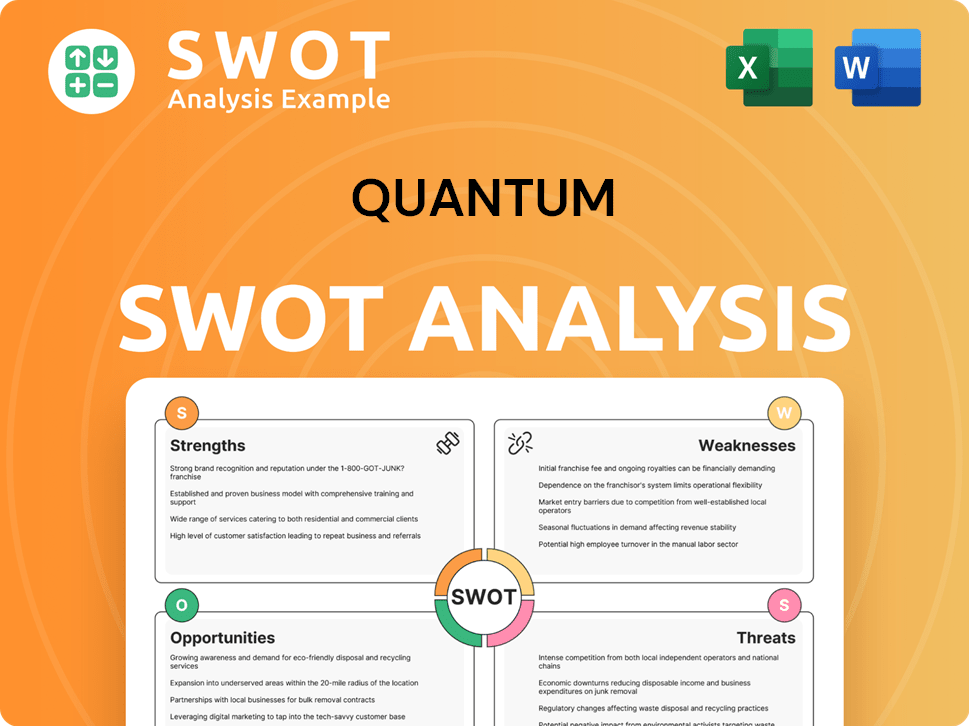
What Marketing Tactics Does Quantum Use?
The marketing tactics of the Quantum Corporation are designed to spotlight its solutions for AI and unstructured data, utilizing digital and traditional channels to boost awareness, generate leads, and drive sales. The company's approach emphasizes innovation, collaboration, and customer-centric solutions, reflecting a strategic focus on the evolving needs of its target markets.
In the dynamic landscape of quantum technology, Quantum Corporation employs a multifaceted strategy to reach its audience. This includes a strong emphasis on content marketing, product demonstrations, and active participation in industry events. These efforts are geared towards showcasing the capabilities of its hardware and applications, as well as addressing specific customer pain points.
Quantum's marketing strategy also involves customer segmentation, tailoring marketing and sales strategies to address the unique needs of specific industries like media and entertainment, surveillance, and scientific research. The company's recent strong pipeline growth for solutions like Myriad and ActiveScale further indicates successful lead generation and customer acquisition efforts, demonstrating the effectiveness of its marketing initiatives. For instance, in 2024, the global quantum computing market was valued at approximately $974.9 million, with projections indicating substantial growth in the coming years, underscoring the importance of effective marketing strategies in this sector.
Quantum Corporation heavily invests in digital marketing, including content creation and SEO. They focus on product launches and financial results through press releases and investor relations websites. These efforts aim to increase visibility and attract potential customers.
Content marketing plays a crucial role for Quantum. The company invests in research and development to stay at the forefront of quantum computing technology. This includes developing groundbreaking solutions to meet evolving customer needs, enhancing their Competitors Landscape of Quantum.
Quantum focuses on product demonstrations and education to potential customers. This hands-on approach allows them to showcase the capabilities of their hardware and applications. They address specific pain points through this direct engagement.
While traditional media is less emphasized, events and industry conferences are significant for direct engagement. Quantum participates in industry discussions and focuses on 're-energizing its go-to-market approach'. This strategy aims to boost sales and marketing.
Quantum employs customer segmentation to tailor marketing and sales strategies. They address the unique needs of specific industries such as media and entertainment. This approach ensures that marketing efforts are targeted and effective.
The company's strong pipeline growth for solutions like Myriad and ActiveScale indicates successful lead generation. These efforts are crucial for customer acquisition. This is a key part of their overall sales and marketing strategy.
Quantum Corporation's marketing strategy includes a blend of digital and traditional methods to reach its target audience. These tactics are designed to support the company's overall sales and marketing strategy, ensuring they remain competitive in the quantum technology market. The company's focus on innovation and customer needs is evident in its marketing efforts.
- Digital Presence: Leveraging content marketing, SEO, and product demonstrations to build awareness.
- Industry Events: Participating in conferences to showcase innovations and engage directly with potential clients.
- Customer Segmentation: Tailoring strategies to address the specific requirements of various industries.
- Lead Generation: Focusing on solutions like Myriad and ActiveScale to drive sales and customer acquisition.
- Market Analysis: Keeping the marketing budget for a quantum company in line with the market analysis report.
Quantum PESTLE Analysis
- Covers All 6 PESTLE Categories
- No Research Needed – Save Hours of Work
- Built by Experts, Trusted by Consultants
- Instant Download, Ready to Use
- 100% Editable, Fully Customizable
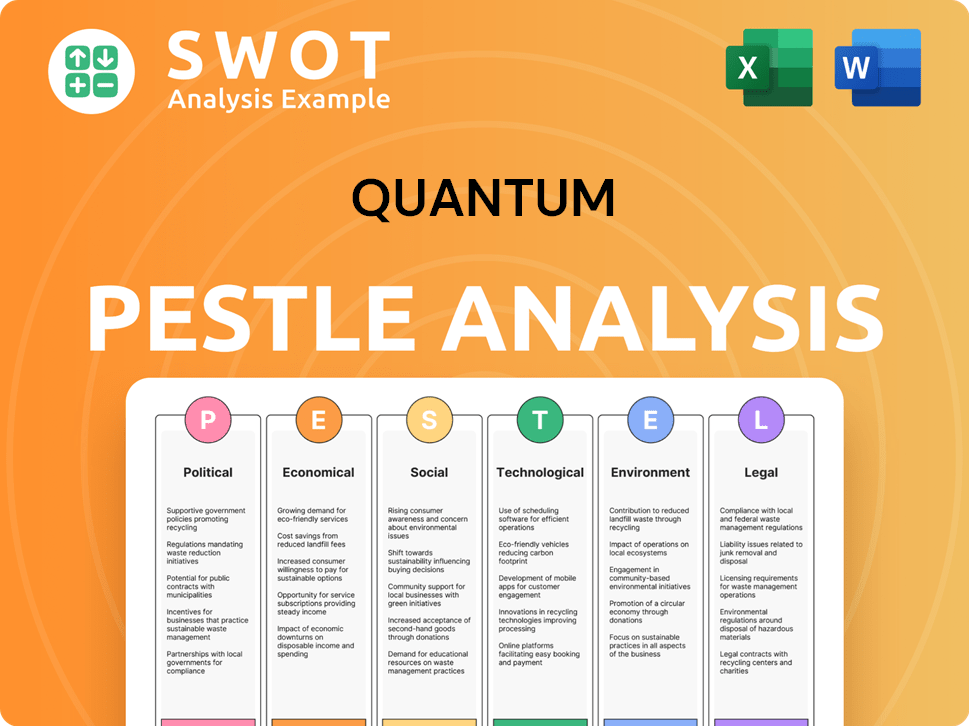
How Is Quantum Positioned in the Market?
The company strategically positions itself as a leader in high-performance and secure data storage solutions, particularly for managing video and unstructured data. Its core message focuses on enabling organizations to efficiently manage and protect large datasets, especially with the rise of AI and data-intensive workloads. This approach differentiates the company by modernizing data storage infrastructures through hybrid and cloud-based solutions.
The company's brand identity is reinforced by its commitment to solving complex data challenges, establishing itself as a trusted partner. This is crucial for organizations that consider their data their most valuable asset. The company's focus on innovation and its ability to provide solutions for capturing, managing, and preserving digital assets further strengthens its appeal to its target audience.
The company's strategy involves consistent messaging across all communication channels, including financial reports and partner programs. The company's responsiveness to shifts in consumer sentiment and competitive threats is demonstrated by its investments in cloud offerings and strategic collaborations, ensuring its brand remains competitive in the rapidly evolving data storage market. For more information, see Target Market of Quantum.
Sales strategies for the company involve focusing on high-performance data management and secure storage solutions. This includes targeting industries like video production, healthcare, and scientific research. The company's go-to-market strategy emphasizes its ability to manage and protect vast amounts of data.
Marketing to investors involves highlighting the company's strategic shift towards cloud and software solutions. This includes showcasing its ability to address complex data challenges and its commitment to innovation. The company's financial reports and strategic collaborations are key elements in this marketing approach.
The company leverages its channel partners to lead in an AI-driven world, ensuring brand consistency. This involves proactive approaches to stay relevant in the rapidly evolving data storage market. The focus is on hybrid and cloud-based solutions.
The marketing plan emphasizes the company's core message of enabling organizations to efficiently manage and protect their data. This includes highlighting flagship products like StorNext and DXi. The plan focuses on innovation and providing solutions for digital asset management.
The company faces challenges in the rapidly evolving data storage market, including quantum storage solutions, AI-driven storage management, and hybrid cloud solutions. The company's ability to adapt to these changes is crucial. The company's responsiveness to shifts in consumer sentiment and competitive threats is key.
- The company's sales cycle length for quantum solutions can be lengthy due to the complexity of the technology and the need for thorough evaluation by potential customers.
- Marketing budget for a quantum company needs to be substantial to cover the costs of educating the market, building brand awareness, and generating leads.
- Quantum company customer acquisition strategies involve targeted marketing campaigns.
- Quantum company product launch strategy includes a focus on early adopters and strategic partnerships.
Quantum Business Model Canvas
- Complete 9-Block Business Model Canvas
- Effortlessly Communicate Your Business Strategy
- Investor-Ready BMC Format
- 100% Editable and Customizable
- Clear and Structured Layout
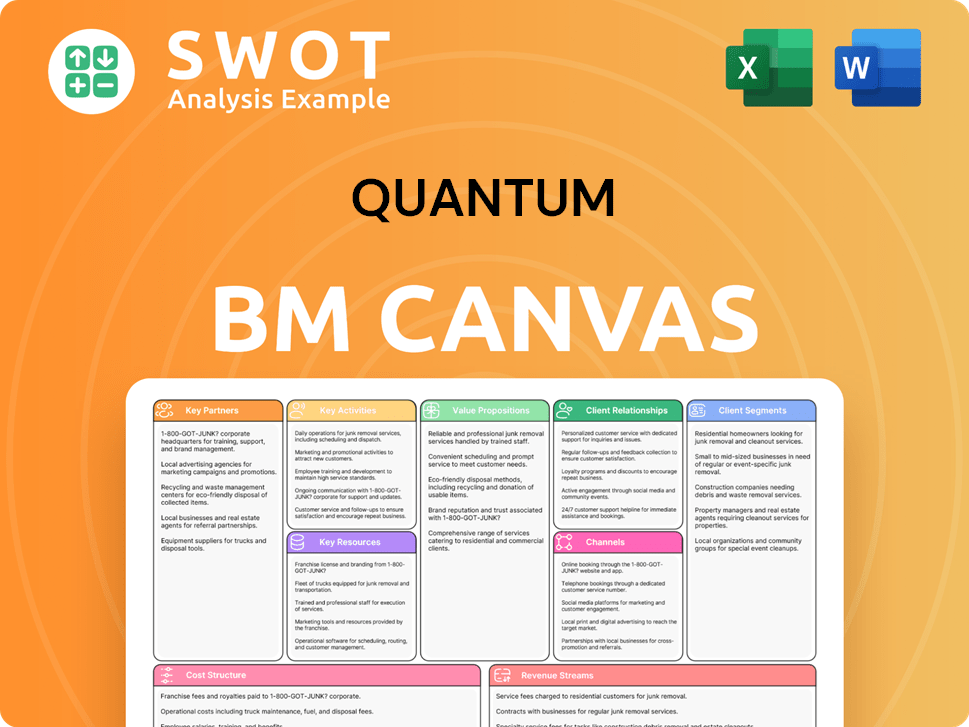
What Are Quantum’s Most Notable Campaigns?
The sales and marketing strategy of the company revolves around several key campaigns designed to drive growth and solidify its position in the technology market. These initiatives are crucial for expanding market share and increasing revenue. The company's approach focuses on a multifaceted strategy that includes transitioning to cloud-based services, launching new products, and forming strategic collaborations.
A primary focus of the company's strategy involves transitioning to cloud-based services and higher-margin, software-based offerings. This shift is designed to capitalize on the growing demand for cloud storage solutions. The company's marketing efforts highlight its commitment to innovation and its ability to meet evolving customer needs. This strategy is supported by significant financial results, such as a 29% year-over-year increase in subscription ARR, reaching $21.3 million in the fiscal third quarter of 2025.
The company's marketing efforts are also centered on launching new products and enhancing existing ones. Initiatives like the DXi data protection appliances and ActiveScale solution are key components of the company's go-to-market strategy. These product launches are supported by successful sales, including a multi-million dollar deal with a European retailer and a 7-figure win with a Japanese research institute. The company leverages these successes to showcase its ability to provide innovative and effective solutions in the competitive technology market.
The company is actively transitioning to cloud-based services to meet the growing demand for cloud storage. This strategic shift is designed to position the company for future growth in the cloud technology market. This strategy includes a focus on subscription-based models to increase recurring revenue and customer retention.
The launch of new products, such as the DXi data protection appliances, is a key marketing initiative. These new products are designed to offer simple, subscription-based data protection solutions. These launches are supported by significant wins, like multi-million dollar deals and 7-figure contracts, demonstrating the effectiveness of the strategy.
Strategic collaborations, such as the partnership with Microsoft, are vital for expanding market reach. These partnerships serve as endorsements, enhancing the company's credibility and visibility. The company's collaboration on the Myriad product further highlights its dedication to innovation and cutting-edge technologies.
The company is increasingly focusing on subscription-based models to attract customers and ensure recurring revenue. The DXi T-Series, launched in March 2025, is a prime example. This approach simplifies offerings and provides flexible consumption models, making the products more accessible.
The company's sales and marketing strategies are multifaceted, focusing on cloud services, new product launches, and strategic partnerships. These initiatives are designed to drive growth and increase market share. The company aims to improve its position within the Revenue Streams & Business Model of Quantum market.
- Focus on Cloud Services: Transitioning to cloud-based services and high-margin software offerings.
- New Product Launches: Introducing innovative products like the DXi data protection appliances.
- Strategic Collaborations: Partnering with industry leaders like Microsoft to expand market reach.
- Subscription-Based Models: Offering flexible consumption models to attract customers.
Quantum Porter's Five Forces Analysis
- Covers All 5 Competitive Forces in Detail
- Structured for Consultants, Students, and Founders
- 100% Editable in Microsoft Word & Excel
- Instant Digital Download – Use Immediately
- Compatible with Mac & PC – Fully Unlocked
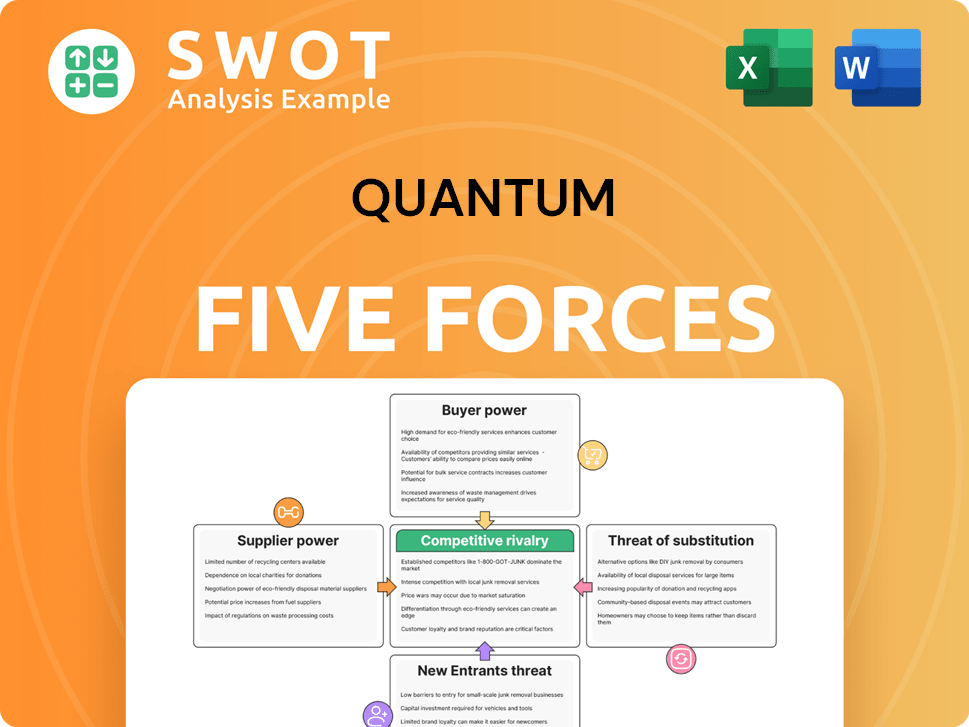
Related Blogs
- What are Mission Vision & Core Values of Quantum Company?
- What is Competitive Landscape of Quantum Company?
- What is Growth Strategy and Future Prospects of Quantum Company?
- How Does Quantum Company Work?
- What is Brief History of Quantum Company?
- Who Owns Quantum Company?
- What is Customer Demographics and Target Market of Quantum Company?
Disclaimer
All information, articles, and product details provided on this website are for general informational and educational purposes only. We do not claim any ownership over, nor do we intend to infringe upon, any trademarks, copyrights, logos, brand names, or other intellectual property mentioned or depicted on this site. Such intellectual property remains the property of its respective owners, and any references here are made solely for identification or informational purposes, without implying any affiliation, endorsement, or partnership.
We make no representations or warranties, express or implied, regarding the accuracy, completeness, or suitability of any content or products presented. Nothing on this website should be construed as legal, tax, investment, financial, medical, or other professional advice. In addition, no part of this site—including articles or product references—constitutes a solicitation, recommendation, endorsement, advertisement, or offer to buy or sell any securities, franchises, or other financial instruments, particularly in jurisdictions where such activity would be unlawful.
All content is of a general nature and may not address the specific circumstances of any individual or entity. It is not a substitute for professional advice or services. Any actions you take based on the information provided here are strictly at your own risk. You accept full responsibility for any decisions or outcomes arising from your use of this website and agree to release us from any liability in connection with your use of, or reliance upon, the content or products found herein.